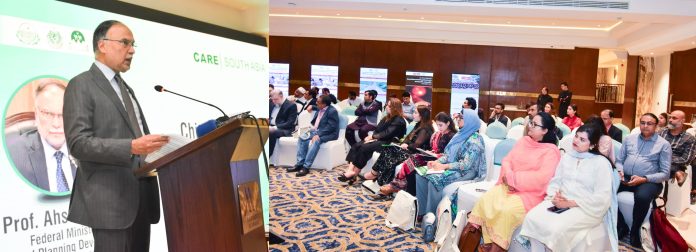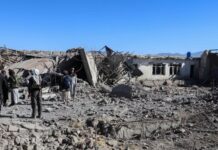 https://twitter.com/home https://www.facebook.com/Shabbir.Hussain191
https://twitter.com/home https://www.facebook.com/Shabbir.Hussain191By Shabbir Hussain
ISLAMABAD, Jul 22 (Alliance News): Federal Minister for Planning, Development, and Special Initiatives, Professor Ahsan Iqbal, has said climate change is no longer a distant threat but a terrifying reality that is already affecting countries like Pakistan.
Speaking at an event titled “From Planning to PRACTICE: Advancing Climate Resilience in Pakistan,” he highlighted how global warming is impacting the environment, economy, and future of the nation.
“Climate change has become a serious threat to the future of humanity,” Ahsan Iqbal said. “It is no longer a distant hypothesis. We are living in its consequences.”
The minister said Pakistan, like many developing countries in the Global South, is bearing the brunt of climate change, despite contributing little to the problem.
He urged developed nations to fulfill their promises of climate financing, calling it a matter of global justice. “The world has always demanded ‘Do More’ from the Global South. Today, we demand: ‘Do More’ from the global powers for environmental justice,” he added.
Recalling the devastating 2022 floods that submerged one-third of Pakistan, displaced millions, and caused billions in damages, the minister said such events are no longer isolated incidents but indicators of a planet in crisis. “These floods were not a fluke. They were a symptom of a planet in crisis,” he said.
Ahsan Iqbal also warned of the alarming rate at which Pakistan’s glaciers are melting—faster than at any point in the last 60 years.
He said this poses a direct threat to the Indus River system, which supports 90 percent of the country’s agriculture and is the backbone of its food security.
Emphasizing the principle of climate justice, he reiterated that the annual $100 billion climate finance pledge made by wealthy nations is not a favor but a necessary responsibility. “This is not a favor. It is a requirement of environmental justice,” he stressed.
He added that the government has placed climate action at the heart of its long-term development goals, integrating it into Pakistan’s national “5Es” framework to ensure a resilient and sustainable future.






